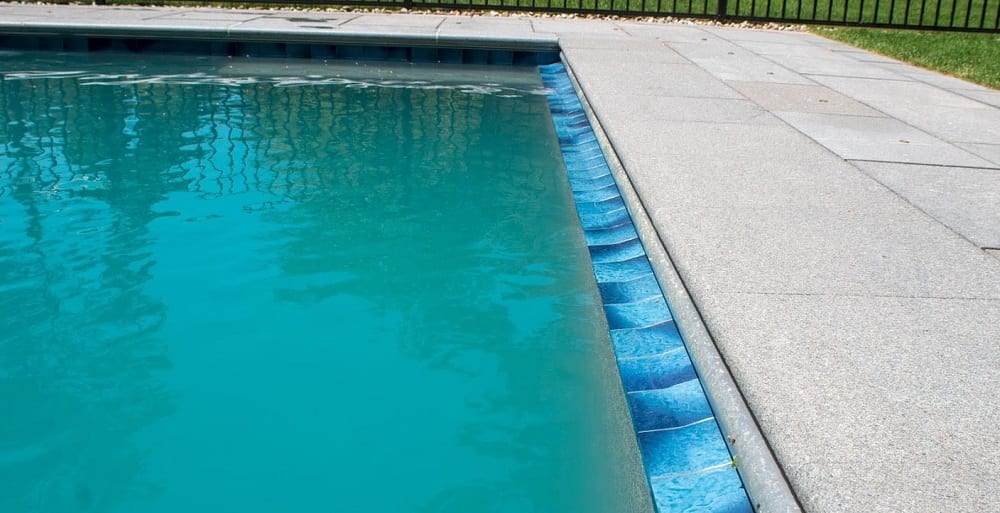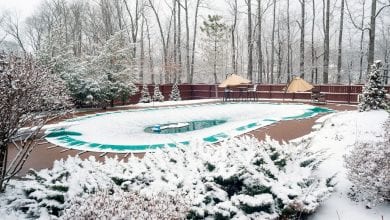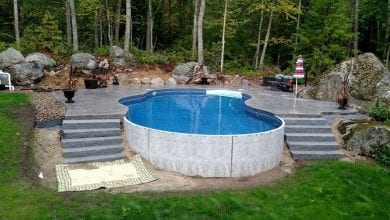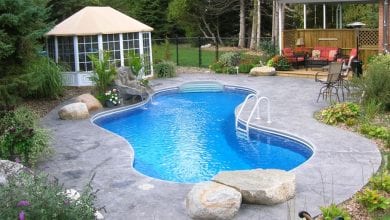
Why Is My Pool Cloudy?
Pool maintenance is simple most of the time but there are days where it provides a few surprises. One of the most common questions asked by new pool owners is about water clarity. SO, if you are wondering why is my pool cloudy then you have come to the right place. There are a few reasons, but also a handful of ways of ensuring it doesn’t become a regular issue. Most reasons are not a major cause for concern and can be remedied with a little know-how.
So, let’s add some clarity to the question.
Reasons Why A Pool Is Cloudy
That cloudy, almost milky looking water is not the most welcoming, and here are some of the causes:
Chlorine Levels Are Off
It could be that the chlorine is either too strong or too diluted. This may be because it has been too long since the last time it was added. It could also be because the pool is being used more, and by more people than usual. Also, during the summer months, UV rays cause a lot of the chemicals to evaporate so this is where regular readings are important. Even a rainy day can throw the chlorine levels off.
Correcting it by taking a reading and applying the relevant chemicals is important since it is chlorine that makes the pool safer from athletes foot, ear infections, salmonella, and other bacteria that can cause infections.
For most pools, the optimal levels are between 2 and 4 ppm.
It Has Been Shocked Recently
All ‘make it jump’ jokes aside, shocking a pool can be a quick way of correcting the chemical balance after it has been neglected for a while. Perhaps you are uncovering a pool for the warm season or returning to a holiday home, to find algae or cloudy water. This is where a pool shock is a good idea.
A strong chlorine odor can be a sign that it needs shocking which will raise levels to break down and kill bacteria, algae, and even chloramines. This will travel through the filter to cleanse the system as well.
Shocking a pool does cause the water to cloud up. This is perfectly normal and a sign that it is working. It should dissipate within 24 hours depending on the brand. The condition of the water can cause it to take longer or not so long. Before you start, consider the calcium levels as some pool shock products can be high in calcium which can make it cloudier.
However, some products do not contain calcium hypochlorite which won’t exasperate this problem.
The Weather
That’s right, a stormy night or a long spell of rain can play havoc with the condition of the water in a pool. It can impact the levels of the chemicals added which is why it is important to check them regularly to avoid getting cloudy water. Those who cover their pool for the winter will find that this isn’t an issue but it takes some effort to keep covering and uncovering a pool in the warmer months.
It is easier to test the chemical levels after a spell of bad weather and add the relevant amounts to bring the balance back to normal.
Faulty Filter
Perhaps the water isn’t being filtered probably, causing it to become cloudy. The pump and filter need to run for a certain amount of hours throughout the day to ensure the water is clean and clear. This can be amended on the timer and it will depend on the type of filter, time of year, frequency of use but for most pools, eight hours a day is sufficient.
The build-up of particles can make it cloudy which is why the filter needs to run, keeping these particles out and ensuring the water looks great and is hygienic to use.
Excessive Calcium
Calcium levels impact how hard the water is. You may have noticed this scaly build-up inside a kettle if you live in an area that has hard water and this can be an issue that occurs with a pool. The first signs of this can be in cloudy water. The next sign can be a blocked pipe down to a calcium deposit build-up. A calcium cleaner can help.
On the opposite end of the scale, soft water can be an issue as well. It can corrode surfaces including pool steps and tiles which is why it is important to test the levels even when the water is clear.
Unbalanced pH Levels
If you aren’t checking your pH levels regularly then you will be wondering why your pool water is cloudy before too long. It is either going to lean towards being too acidic or too basic if the balance is out and ideally should be between 7.0 and 8.0. If the pH is over 8, the chemicals such as chlorine are not going to be able to do their job which will show in the form of cloudy water.
Any water that is too acidic (below 7.0) is going to be cause for concern for the pool lining.
How To Clear Cloudy Pool Water
So, one of the above problems is causing your pool water to cloud, so let’s take a look at how to reverse it and make it nice and clear again.
Test It
The most effective and convenient way of clearing murky water is by testing the chemical levels. This should be part of your twice-weekly maintenance (depending on the time of year) but if the water is cloudy then perhaps this has been neglected for a while.
There should be no real cause for concern and testing the balance of chemicals can tell you everything you need to know about the quality of water’s condition. There are two common options here, so choose from a water testing kit and test strips. The best time of day is in the morning before the sun has had a chance to impact chlorine levels and reach below the surface to gather a sample rather than wave it along the top.
A reading will tell you how much or little chlorine, pH, and other chemicals there are in the water, making any adjustments easy.
Vacuum Regularly
A pool filter can only do so much, especially when located towards the top of the pool as most of them are. Water can become cloudy because of the debris that collects at the bottom of the pool, even on the walls of algae and bacteria, and starting to form. This is why regular pool maintenance is vital. Even swimming can help lift some of the debris so it doesn’t look so cloudy – there is no better way of cleaning a pool!
Pour Some Pool Clarifier Into The Water
One of the best ways to keep pool water clear is to prepare the water in advance and make sure it doesn’t get a chance to cloud over. A lot of the time, cloudy water is the result of particles building up, and a clarifier causes them to bind together, keeping the water clear.
Pour Some Pool Floc Into The Water
It has a similar effect to other methods but works differently. In the form of a powder, dissolve it in water, then throw it into the pool. After turning the pump off for up to 48 hours (always read the instructions for the specific brand you use!) and it will cause the particles that are clouding the water to bind together. They get heavy and fall to the bottom of the pool.
When you notice this has happened, and the adequate time has passed, use a pool vacuum to remove them from the pool and enjoy the clear water.
Check The Filter Cartridge
A damaged filter can be a faulty one, so check on its condition. Running a hose over it can clean it and give it a boost but if it is a couple of years old or more then the chances are that it is not working in the way it should. A replacement will help keep the water clear and any signs of damage such as cracks are a sign that it is time to replace the filter.
Check The Filter
The filter itself might be blocked or faulty and this will mean the system is not able to work its magic and keep the water clear. Clean the filter properly using a filter cleaner at least twice a season to help make sure it is in good working condition. This will protect it against future damage. Sometimes the filter can be beyond cleaning and is completely blocked which is where it is time to considering installing a new one.
Maintain It Regularly
This is almost a round-up of all of the above, regular maintenance is key to prolonging the lifespan of all the working parts and the pool itself. The water will be easier to maintain when done weekly in the low season and more regularly when the UV rays of the sun and regular use impact the chemical balance.
It is also vital when using the pool as it will ensure the water is safe to use. No one should be going anywhere near a swimming pool that has not been maintained properly. So, checking the chemical levels is one thing, but cleaning it is another. Use a vacuum to go over the bottom of the pool and the walls, and a pool net to scoop up any floating debris and bugs.
Check the filter and remove any large pieces of debris, making sure to rinse it with a hose and clear it out. Don’t forget to check the condition of the filter and clean it every couple of months or so and shock the water if necessary.
Conclusion
There are a handful of common reasons for pool water to become cloudy and although none of them are severely dangerous, they all require attention and correcting. Thankfully, most of the methods mentioned above are easy so there is no excuse for neglecting a cloudy pool. Never get into a pool where the water is cloudy and act to correct it.
Regular maintenance is the key to having a clean pool and just scooping the debris isn’t enough. Before getting in, make sure it hasn’t been too long since the pool was vacuumed, scooped, and the chemical levels were optimized.
FAQ’s
Can You Use Baking Soda To Clear A Cloudy Pool?
This is not a recommended method. It is mainly because it will significantly raise the pH levels of the pool. Not only is this something to avoid, but it will likely cause the water to become more cloudy. Although it can affect, there is no replacement for using designated pool chemicals. Chlorine is the most common option to ensure the water is clean and clear.
Is It Safe To Swim In A Cloudy Pool?
No. Because there are different reasons behind the cloudiness, it is never safe to go into the water until the cause has been determined. Even still, it is best to see if the action you take works before getting in so you can be sure. If the water is cloudy then it is not safe for other swimmers to go into as you may not be able to see them if they are struggling underneath the surface.
Also, the water may be full of bacteria and other nasties. To avoid causing yourself serious illness (E.Coli is commonly found in cloudy pool water), stay clear until they have been removed.
How Long Does It Take To Clear A Cloudy Pool?
This depends on the cause and method of cleaning. Shocking a pool may require that it is left for up to two days. Alternatively, it can be a matter of minutes for other causes. Having the right chemicals to handis going to quicken the process as having to go out and buy additional products is going to increase the time it takes before the pool can be used again.







